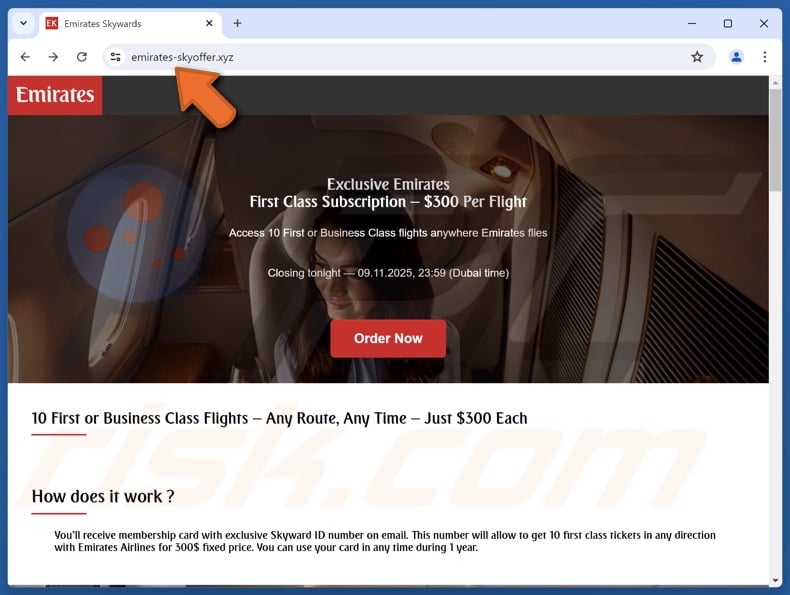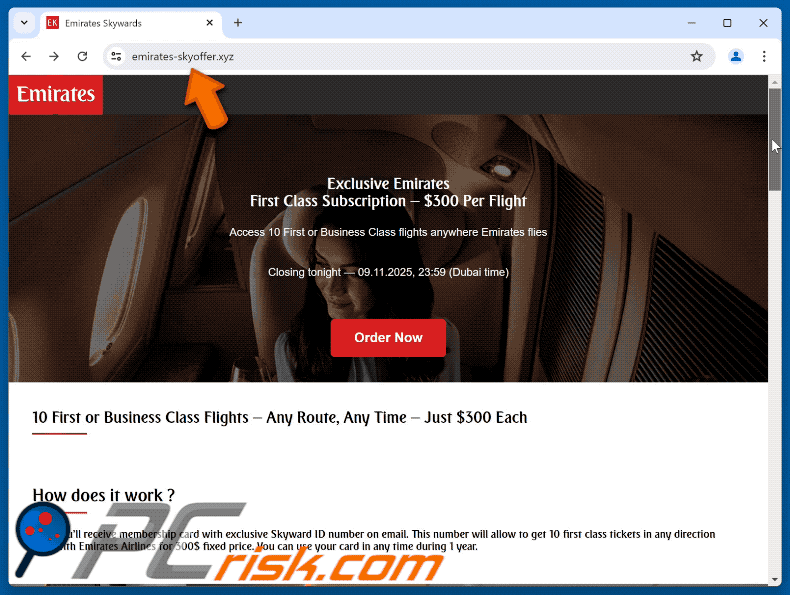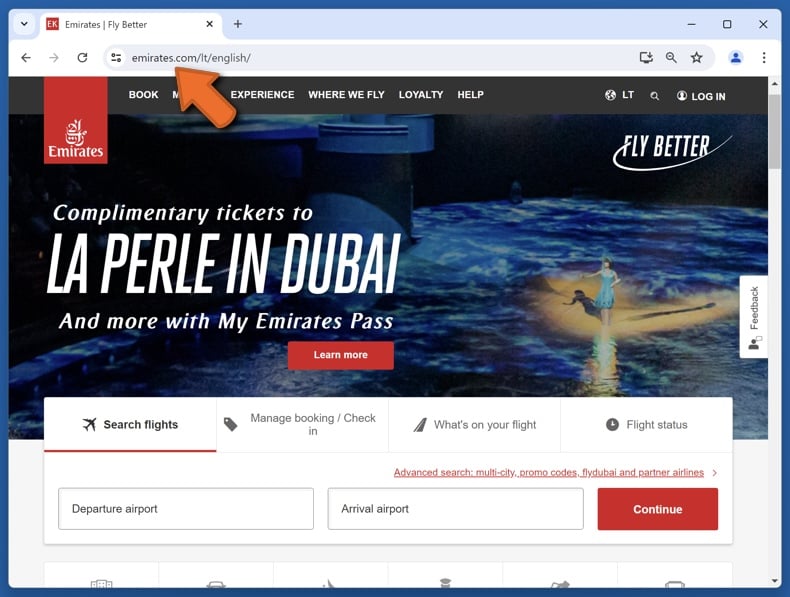How to avoid getting scammed by fake "Emirates First Class Subscription" sites
Phishing/ScamAlso Known As: "Fake Emirates First Class Subscription" phishing scam
Get free scan and check if your device is infected.
Remove it nowTo use full-featured product, you have to purchase a license for Combo Cleaner. Seven days free trial available. Combo Cleaner is owned and operated by RCS LT, the parent company of PCRisk.com.
What kind of scam is this fake "Emirates First Class Subscription" website?
The "Emirates First Class Subscription" scam refers to fake Emirates airline webpages that target personally identifiable and finance-related data. The lure is membership for ten First Class flights at an incredibly low cost. It must be stressed that this phishing scam is not associated with the actual Emirates airline.

Fake "Emirates First Class Subscription" website overview
At the time of research, this phishing scam was promoted on emirates-skyoffer[.]xyz, yet it could also be hosted on different domains. The page impersonates Emirates' official website (emirates.com). Emirates is one of the two flag carriers of the United Arab Emirates. The deceptive webpage offers a "First Class Subscription" for ten flights in First or Business class for $300 per flight. The membership will be valid for a year, and the price is fixed without any route or departure time limitations.
It must be emphasized that this offer is fake, and this scam is in no way associated with the Emirates airline or any other legitimate entities.
When a user attempts to register for this subscription, they are required to provide their personal data: full name, mobile phone number, and email address. Afterward, they are asked to enter their credit/debit card details for payment. Scammers can use personally identifiable information for a variety of nefarious activities, including to steal the victim's identity. Financial data can be utilized to facilitate fraudulent transactions and online purchases.
In summary, by trusting a scam like this fake "Emirates First Class Subscription" site – users can experience severe privacy issues, financial losses, and identity theft.
If you have already entered your information into a phishing website/file – contact the appropriate authorities without delay.
| Name | "Fake Emirates First Class Subscription" phishing scam |
| Threat Type | Phishing, Scam, Social Engineering, Fraud |
| Fake Claim | Subscription for 10 First Class flights for $300 per flight. |
| Disguise | Emirates airline |
| Related Domains | emirates-skyoffer[.]xyz |
| Detection Names | alphaMountain.ai (Spam), Forcepoint ThreatSeeker (Suspicious), Fortinet (Spam), Full List Of Detections (VirusTotal) |
| Serving IP Address | 172.67.176.189 |
| Distribution methods | Compromised websites, rogue online pop-up ads, potentially unwanted applications. |
| Damage | Loss of sensitive private information, monetary loss, identity theft. |
| Malware Removal (Windows) |
To eliminate possible malware infections, scan your computer with legitimate antivirus software. Our security researchers recommend using Combo Cleaner. Download Combo CleanerTo use full-featured product, you have to purchase a license for Combo Cleaner. 7 days free trial available. Combo Cleaner is owned and operated by RCS LT, the parent company of PCRisk.com. |
Phishing scam examples
We have examined thousands of online scams; fake "Mainnet Deployer" website, fake "Monero" website, "Google Voice pop-up scam", "Trezor Security Update scam", and fake "Atomic Wallet" website are merely some of our articles on phishing scams.
The Internet is rife with deceptive and malicious content. Scams can vary significantly in appearance and modus operandi. However, the end goal is the same – to generate revenue at their victims' expense. Therefore, we strongly advise vigilance when browsing.
How did I open a scam website?
The most widely used online scam promotion techniques include: malvertising (intrusive ads), sites using rogue advertising networks (redirects), spam (e.g., emails, PMs/DMs, social media/ forum posts, browser notifications, robocalls/ cold calls, SMSes, etc.), typosquatting (mistyped URLs), and adware (advertisements/redirects).
How to avoid visiting scam websites?
Caution is key to ensuring your online safety. Therefore, be wary of websites, ads, and messages that make unbelievable promises or urge you to take action against imminent threats. Pay attention to URLs and enter them carefully.
Do not use sites offering pirated content or other dubious services (e.g., Torrenting, illegal streaming/downloading, etc.), as these webpages are usually monetized via rogue advertising networks. Ignore or block browser notification requests from questionable websites.
Do not open attachments or links found in suspicious/irrelevant emails and other messages. Download only from official/verified sources and be attentive during installation (e.g., study terms and options, use "Custom/Advanced" settings, and opt out of additional apps, extensions, tools, etc.) – to prevent bundled/hazardous software (such as adware) from infiltrating the device.
If your computer is already infected, we recommend running a scan with Combo Cleaner Antivirus for Windows to automatically eliminate all threats.
Appearance of a fake "Emirates First Class Subscription" website (GIF):

Screenshot of the official Emirates website (emirates.com):

Instant automatic malware removal:
Manual threat removal might be a lengthy and complicated process that requires advanced IT skills. Combo Cleaner is a professional automatic malware removal tool that is recommended to get rid of malware. Download it by clicking the button below:
DOWNLOAD Combo CleanerBy downloading any software listed on this website you agree to our Privacy Policy and Terms of Use. To use full-featured product, you have to purchase a license for Combo Cleaner. 7 days free trial available. Combo Cleaner is owned and operated by RCS LT, the parent company of PCRisk.com.
Quick menu:
- What is "Fake Emirates First Class Subscription" phishing scam?
- How to identify a pop-up scam?
- How do pop-up scams work?
- How to remove fake pop-ups?
- How to prevent fake pop-ups?
- What to do if you fell for a pop-up scam?
How to identify a pop-up scam?
Pop-up windows with various fake messages are a common type of lures cybercriminals use. They collect sensitive personal data, trick Internet users into calling fake tech support numbers, subscribe to useless online services, invest in shady cryptocurrency schemes, etc.
While in the majority of cases these pop-ups don't infect users' devices with malware, they can cause direct monetary loss or could result in identity theft.
Cybercriminals strive to create their rogue pop-up windows to look trustworthy, however, scams typically have the following characteristics:
- Spelling mistakes and non-professional images - Closely inspect the information displayed in a pop-up. Spelling mistakes and unprofessional images could be a sign of a scam.
- Sense of urgency - Countdown timer with a couple of minutes on it, asking you to enter your personal information or subscribe to some online service.
- Statements that you won something - If you haven't participated in a lottery, online competition, etc., and you see a pop-up window stating that you won.
- Computer or mobile device scan - A pop-up window that scans your device and informs of detected issues - is undoubtedly a scam; webpages cannot perform such actions.
- Exclusivity - Pop-up windows stating that only you are given secret access to a financial scheme that can quickly make you rich.
Example of a pop-up scam:

How do pop-up scams work?
Cybercriminals and deceptive marketers usually use various advertising networks, search engine poisoning techniques, and shady websites to generate traffic to their pop-ups. Users land on their online lures after clicking on fake download buttons, using a torrent website, or simply clicking on an Internet search engine result.
Based on users' location and device information, they are presented with a scam pop-up. Lures presented in such pop-ups range from get-rich-quick schemes to fake virus scans.
How to remove fake pop-ups?
In most cases, pop-up scams do not infect users' devices with malware. If you encountered a scam pop-up, simply closing it should be enough. In some cases scam, pop-ups may be hard to close; in such cases - close your Internet browser and restart it.
In extremely rare cases, you might need to reset your Internet browser. For this, use our instructions explaining how to reset Internet browser settings.
How to prevent fake pop-ups?
To prevent seeing pop-up scams, you should visit only reputable websites. Torrent, Crack, free online movie streaming, YouTube video download, and other websites of similar reputation commonly redirect Internet users to pop-up scams.
To minimize the risk of encountering pop-up scams, you should keep your Internet browsers up-to-date and use reputable anti-malware application. For this purpose, we recommend Combo Cleaner Antivirus for Windows.
What to do if you fell for a pop-up scam?
This depends on the type of scam that you fell for. Most commonly, pop-up scams try to trick users into sending money, giving away personal information, or giving access to one's device.
- If you sent money to scammers: You should contact your financial institution and explain that you were scammed. If informed promptly, there's a chance to get your money back.
- If you gave away your personal information: You should change your passwords and enable two-factor authentication in all online services that you use. Visit Federal Trade Commission to report identity theft and get personalized recovery steps.
- If you let scammers connect to your device: You should scan your computer with reputable anti-malware (we recommend Combo Cleaner Antivirus for Windows) - cyber criminals could have planted trojans, keyloggers, and other malware, don't use your computer until removing possible threats.
- Help other Internet users: report Internet scams to Federal Trade Commission.
Frequently Asked Questions (FAQ)
What is an online scam?
Online scams are a type of deceptive Web content designed to trick users into performing specific actions. For example, victims can be enticed/scared into disclosing sensitive information, subscribing to services, purchasing products, sending money to scammers, calling fake support lines, downloading/installing programs, etc.
What is the purpose of online scams?
The purpose of online scams is to generate revenue for scammers. These cyber criminals primarily profit by abusing/selling private data, promoting content (e.g., sites, products, services, software, etc.), acquiring funds through deception, and proliferating malware.
I have provided my personal information when tricked by an online scam, what should I do?
If you have disclosed your personally identifiable or financial information (e.g., passport photos/scans, ID card details, debit/credit card numbers, etc.) – immediately contact the appropriate authorities. And if you have provided log-in credentials – change the passwords of all potentially exposed accounts and inform their official support without delay.
Why do I encounter online scams?
Online scams are predominantly encountered through intrusive advertisements, spam (e.g., browser notifications, emails, social media posts, DMs/PMs, calls, SMSes, etc.), webpages using rogue advertising networks, misspelled URLs, and adware.
Will Combo Cleaner protect me from online scams?
Combo Cleaner is designed to scan visited websites for deceptive/malicious content and restrict all further access to these pages.
Share:

Tomas Meskauskas
Expert security researcher, professional malware analyst
I am passionate about computer security and technology. I have an experience of over 10 years working in various companies related to computer technical issue solving and Internet security. I have been working as an author and editor for pcrisk.com since 2010. Follow me on Twitter and LinkedIn to stay informed about the latest online security threats.
PCrisk security portal is brought by a company RCS LT.
Joined forces of security researchers help educate computer users about the latest online security threats. More information about the company RCS LT.
Our malware removal guides are free. However, if you want to support us you can send us a donation.
DonatePCrisk security portal is brought by a company RCS LT.
Joined forces of security researchers help educate computer users about the latest online security threats. More information about the company RCS LT.
Our malware removal guides are free. However, if you want to support us you can send us a donation.
Donate
▼ Show Discussion